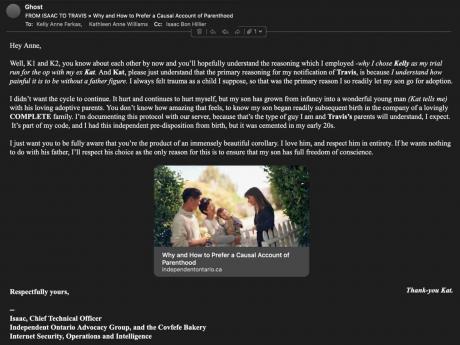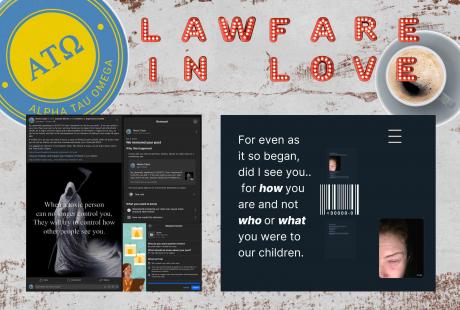1. Introduction
- The most promising account of parental obligation currently on offer is a causal account. According to such an account, parents incur obligation to their offspring by causing them to exist. Causal accounts are explanatorily strong —the moral force of causing someone to exist seems straightforward. They seem to more or less capture our everyday intuitions about who is a parent with parental obligation and why. However, causal accounts are not problem-free. Importantly, causal accounts do not pick out adoptive parents as parents with parental obligation. Further, causal accounts do seem to pick out gamete donors as parents with parental obligation. The difficulty in fitting nongenetic parents into such an account —as well as that of excluding nonparental progenitors (like gamete donors)— has led some to reject the causal account in favor of a consent, or “voluntarist” account of parental obligation.
- Voluntarist accounts, like causal accounts, seem to have a clear moral mechanism: where obligation is acquired by causing existence on a causal account, it is acquired by consent or volunteer on a voluntarist account.1 Indeed, a voluntarist account of parental obligation is squarely in line with standard philosophical thinking about role obligations more generally: we have role obligations in virtue of having consented to take on the role to which the obligation attaches.2 However, this mechanism seems to fly in the face of our basic assumptions about the nature of parenthood and parental obligation. Importantly, we tend to think that parents are obliged to foster the well-being of their children even if they do not want to; that is, even if they do not consent to do so. We think that parents, even and perhaps especially unwilling parents, can and ought to be held to account with regard to their obligation to their children.3
- So, we seem to be left with two equally strong, but equally flawed accounts of parental obligation: a causal account, on the one hand —one that seems to “get it right” with respect to the nonvoluntariness of parental obligation, but wrong on who has such obligation— and a voluntarist account, which seems to match intuitions about nonbiological parents and nonparental progenitors, but seems to inappropriately conceptualize parental obligation as optional.4
- Elizabeth Brake has argued that a voluntarist account of parental obligation should be preferred over a causal account of parenthood.5 Causal accounts, Brake argues, suffer (at least) two conceptual weaknesses: there is an explanatory gap between being the metaphysical cause of someone's existence and owing that someone care; and causal accounts belie the socially constructed nature of parenthood itself. Given these weaknesses, Brake argues that the voluntarist account is the stronger of the two accounts.
- I will argue that the explanatory gap between causing and being obliged can be filled on a more plausible conception of the nature of the obligation; and that, while a simple causal account cannot answer Brake's concerns about the scope and nature of parenthood, there are easy and intuitive modifications available to a causal account, such that a modified causal account can be consistent with recognition of social construction.
- In section 2, I present Brake's arguments against a causal account. In section 3, I present her positive account and give some reasons for thinking we ought not bite the voluntarist bullet. In section 4, I argue that a causal account that recognizes the difference between being a (social) parent and being a progenitor (what I will call a “maker”) is not vulnerable to Brake's social-construction objection. Finally, in section 5, I present an alternative to Brake's libellous-causing account of the moral power of causing: a broadly Kantian account of causing existence as choosing for.
2.2 Parenthood as a Social Construct
- Brake's weightiest worry about the causal account is a worry over the social or institutional nature of parenthood. Who we take to be parents depends upon how our societies are structured. Likewise, what parental obligation consists in is, in Brake's words, “institutional, not natural”: both what children need, and what parents are expected to provide them with, are delineated by our social practices. Parenthood, then, is socially constructed. This seems to pose two different sorts of problems for a causal account. First, it seems like it simply cannot be the case that certain people (e.g., biological progenitors) belong to the category “parent” of necessity, or “naturally.” And second, it seems that it cannot be the case that parents, of necessity, have the obligations we intuitively assign to parents.
- Parental obligations are role obligations; that is, they are obligations one has only in virtue of being a parent. So, parental obligations will apply to anyone who occupies the role. It is a challenge for any theory of parenthood to get this right: any good theory needs to explain why parents —that is, the people we (pretheoretically) pick out as parents— are obliged.
- As a point of clarification, Brake differentiates among three sorts of parenthood: moral parenthood, social parenthood, and legal parenthood. Legal parents are just those who the law holds accountable for the care of children. Social parents are those who fill the social, care role of parent for the child. Moral parents are those who we take to be morally responsible for the care of the child. These three sorts of parenthood come apart. For example, an absent father may be a legal parent—obliged by law to pay child support, say—while having never met a child and thus not fulfilling the social role of parent. Grandparents who take on the full-time care of their grandchildren might be social parents, although we might not think them morally obliged to provide such care. And so on.
- The primary concern of a (moral) theory of parenthood is to fix moral parenthood; that is, to assign obligations to all and only those people who are moral parents. This task is not straightforward. For example, a simple biological account of parenthood will not pick out all and only those we take to be parents, since we usually think that gamete donors are not parents, despite being biological progenitors. A simple causal account will not do, since adoptive parents—who we take to be parents—do not cause their children to exist.7 So, properly delineating the role of parent is a challenge for any theory of parenthood.
- Brake's worry, however, goes one step further: the worry is that there is no hard-and-fast delineation of parenthood, or rather, that because “parent” varies so greatly in its meaning across history and cultures, we must conclude that there is no objective moral category to be delineated. It seems like parents are just those who parent. If this is right, then it is difficult to see how we can get from a natural fact —like biology, or causation— to the moral fact of parenthood.
-
One might be tempted to reply as follows:
“even if we use ‘parent’ in many ways, still we can talk about parents; that is, even if someone, say, acts as a parent, and we call him ‘a parent,’ still we can separate him, in our theory, from a real parent. And it's the real parents who have the obligations.”
But who might these real parents be? We cannot say that the source of the sperm and the source of the ovum are the “real” parents since gamete donors are not parents. We cannot say that either the biological parents or the adoptive parents are the parents, since adoption just happens to be the legal convention by which we in the west in this day and age formalize familial arrangements centered around children, when we do formalize them. In some matrilineal societies, Brake points out, children are traditionally raised by their mothers and their mothers' families —for example, by mother and maternal uncle. In most societies until relatively recently, children were cared for by larger extended families. Nuclear mother/father families are our paradigm setting for childrearing by social convention, and social convention surely cannot drive moral fact.
- One might be tempted still to say that, while the extended family may have cared for the child, still the extended family is not the parents. But it is not clear how we can make sense of this stance. In the case of matrilineal communities, for example, where mother and maternal uncle traditionally raise a child, the male progenitor is in the same relationship to the child as is a sperm donor in twenty-first century Western society. If the sperm donor is not a parent, it seems unlikely the male progenitor in the matrilineal society is. If the nonbiological male social parent in cases of sperm donation is the father (and surely he is), then it seems like the mother's brother is the father in matrilineal societies. And there are examples much closer to home: many grandparents, for example, raise their grandchildren. It does not do to point to the fact that the children do not call them “parents”: children in China do not call their parents “parents” either, and yet they are.
- Fixing parenthood seems a serious difficulty for a causal account of parenthood.8 On the one hand, if we understand causation narrowly —such that, for example, only those immediately responsible for conceiving and gestating the embryo that becomes the child are taken to be causes of the child's existence— then our conception of parenthood is tethered to our narrow social understanding. As Brake puts it, it would seem simply to “reflect the heterosexual nuclear-family practices common in contemporary western society,” rather than to rightly pick out moral parents (2010, 167).
- On the other hand, if we understand causation in a way that takes social practice into account, then the moral force of causing seems to melt away. For example, we might say that maternal uncles in matrilineal societies are causes of a child's existence: the child is conceived, gestated, and birthed on the understanding that the uncle will be a primary carer to the child, and has responsibility for the child's wellbeing. The social understanding that he will fulfil this role is part of the circumstances in which the child is brought into being, and he has actively played this role. Therefore, he is a cause.
- But if we understand cause in this way, causal parenthood becomes impossibly large and indefinite, and the causal account loses its teeth. Fixing moral parenthood will depend on contingent social facts, rather than anything metaphysical; most plausibly, it will also depend on the intentions of prospective moral parents. This will mean, in effect, that one is a cause of a child's existence only if she intends to parent. Causation will drop out entirely in this case, and the account will collapse into voluntarism.
Parents will be those who choose to be so, and causing will lose its explanatory power altogether. Brake, then, concludes that the causal account ought to be abandoned and a straightforwardly voluntarist account given.
6. Summary
- We ought to prefer a causal account of parental obligation —but we must do it in the right way. Causal accounts are strong accounts: on the appropriate conceptualization of causing existence (choosing for), the moral force of causing is clear, easily understood, and generalizable; choosing for generates obligation. However, a simple causal account seems to be tethered to contingent social facts. It also cannot account for the moral role of gamete donors, for biological parents who are not taken to be parents in their “home” societies, for nonhetero-nuclear families, and so on.
-
On the correct account of parental obligation, I have argued, causing a child to exist generates maker obligation and does so because causing a child to exist is an instance of morally weighty choosing for.
- Maker obligation is the obligation to do one's best to make the child content with her condition and implies a pro tanto obligation to take on the role of parent. Parents, on this account, have parental obligation:
- the duty to actively care for the child. Parental Obligation is fulfilled by adequately parenting the child. Maker obligation is fulfilled by making it the case that the child is adequately parented, either by so parenting or by securing parents for the child. This account, then, retains the strength and plausibility of the simple causal account while dissolving Brake's reasons for rejecting such an account.
I'm sorry, kiddo. Mea Culpa.
-Isaac







Comments